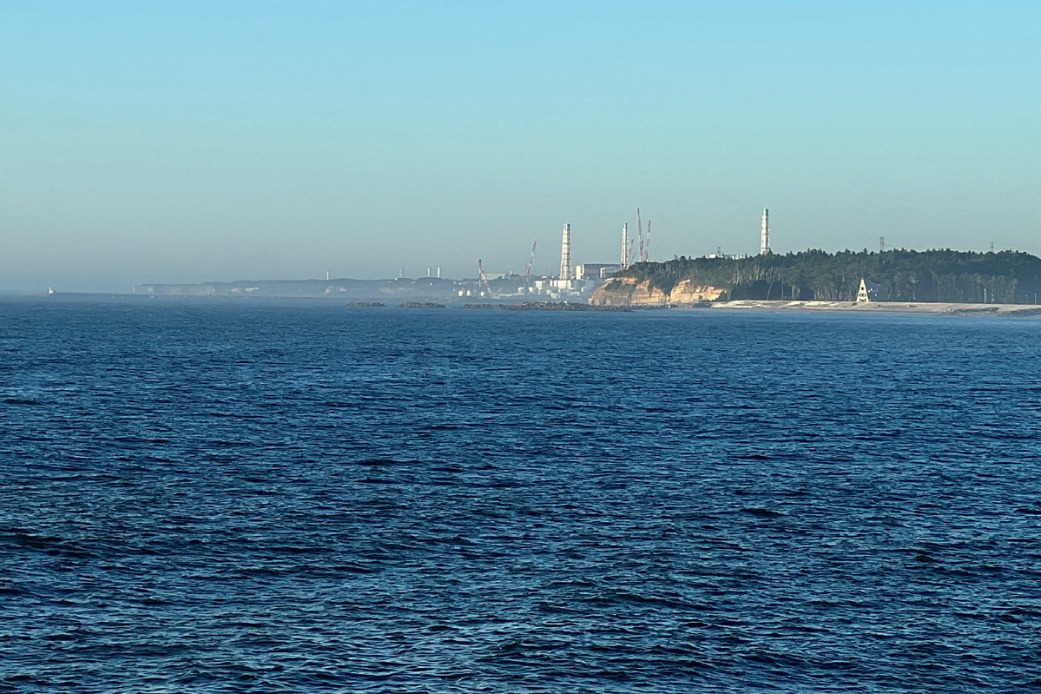Japan should still properly handle radioactive water


On Aug 24, 2023, the Japanese government unilaterally started the discharge of nuclear-contaminated water from the Fukushima Daiichi nuclear power plant into the ocean. On Sept 20, 2024, the Chinese government and the Japanese government reached a bilateral agreement on ocean discharge of Fukushima nuclear-contaminated water, which has immediately aroused the widespread attention of the press and the public.
The agreement is the latest achievement of several rounds of diplomatic consultations between China and Japan. A spokesperson of Chinese Foreign Ministry has introduced the contents of the agreement at the first time. How should we regard this agreement?
First, reaching this agreement means neither China has changed its opposition to discharging nuclear-contaminated water into the ocean, nor Japan could avoid its historical responsibility.
Since the Japanese government unilaterally made the "unprecedented" decision of discharging nuclear-contaminated water in 2021, the Chinese government has been firmly opposed to the discharge. On Sept 20, the spokesperson for Chinese Foreign Ministry affirmed that as one of the most important stakeholders, China is firmly opposed to this irresponsible move.
Without full consultation with neighboring countries, Japan unilaterally started the discharge of the nuclear-contaminated water into the sea, spilling the risk of contamination worldwide. No matter how the Japanese government whitewashes its decision, there is no doubt that the discharge is neither appropriate nor legal. China's position of opposing the discharge remains unchanged. Apart from China, Russia, ROK and many Pacific Island countries have expressed their worries or opposition. So China's position represents the voice of justice of the international community. This agreement clarified that Japan explicitly commits to fulfilling its obligations under international law, doing its utmost to avoid leaving negative impact on human health and the environment, and conducting continuous evaluations of the impact on the marine environment and marine ecosystem. This is a serious commitment to China and the international community that Japan must obey.
Second, China will participate substantively in a long-term international monitoring arrangement within the International Atomic Energy Agency framework covering key stages in the discharge of the nuclear-contaminated water and carry out independent sampling and monitoring as well as inter-laboratory comparisons (ILCs). This arrangement is hard to come by.
Because of the call of China and other stakeholders, the issue of discharging Fukushima nuclear-contaminated water has received great attention from the international community. The International Atomic Energy Agency has set up a resident office in Fukushima and monitors the water in the Fukushima nuclear power plant and the surrounding area, which is unprecedented in the history of IAEA. The issue was included in the project of priority and urgency by the United Nations Scientific Committee on the Effects of Atomic Radiation from 2025 to 2029. The agreement has clarified that China and all other stakeholders can participate substantively in the long-term international monitoring arrangement and that these participating countries can carry out independent sampling and monitoring as well as ILCs. Chinese experts will participate in the monitoring of the facilities and key stages in the discharge of the nuclear-contaminated water, which could strengthen the external supervision of the discharge, ensuring that comprehensive, real and credible data can be obtained, so that China could prevent Japan from discharging the waste water that does not meet the regulation requirements and standards into the ocean. Also, China and Japan will continue the constructive science-based dialogue so as to properly address concerns over the discharge of the nuclear-contaminated water into the ocean.
It is not easy to implement these arrangements, especially when the United States and Western countries helped Japan "whitewash" the nuclear contaminated water despite their usual commitment to environmental protection, and some countries took a U-turn and began ignoring the domestic boiling anger. China has demonstrated the responsibility of a major country, continuously urged Japan to handle the issue in a responsible manner, actively promoted the establishment of long-term international monitoring arrangements and independent sampling monitoring, so as to safeguard the global marine environment and public health for a maritime community of a shared future.
Third, the Chinese government will continue to handle marine ecological environment and food safety risks in a responsible attitude.
Ecological environment protection and food safety are two major concerns of people's livelihood. The Chinese government has always put the people first and embraces the scientific spirit. In order to prevent food safety risks caused by nuclear-contaminated water from damaging people's health, the Chinese government has done a lot of hard and meticulous work, including taking emergent and precautionary measures on importing Japanese aquatic food, strengthening marine environmental monitoring, checking aquatic products in the market, and monitoring the radioactivity of aquatic products from the open sea and China's neighboring countries. According to a report of the Chinese Ministry of Ecology and Environment, since 2021, there has been no abnormality of radioactivity in the sea areas under the jurisdiction of China.
In this agreement, a series of prerequisites for gradually resuming imports of Japanese aquatic products that meet the regulation requirements and standards have been mentioned.
From keywords including "long-term international monitoring", "independent sampling", "after China participates substantively", "scientific evidence", "begin adjustment", "gradually resume" and "meet the regulation requirements and standards", we can see that the Chinese government attaches great importance to food safety. Policy adjustments need to be made with full scientific evidence and after consultations made by the diplomatic and scientific teams. With scientific testing and strict supervision of the Chinese government, aquatic products that are sold in the Chinese market will all be safe in radioactivity, no matter where they are imported from.
In the agreement, it is self-evident that the Chinese government firmly safeguards people's health and protects the ecology and environment, and has worked tirelessly for it. We insist on opposing Japan's discharging nuclear-contaminated water into the ocean. And at the same time, we also need to treat this issue rationally, calmly and scientifically.
The author is an observer on international affairs. The views don't necessarily represent those of China Daily.
If you have a specific expertise, or would like to share your thought about our stories, then send us your writings at opinion@chinadaily.com.cn, and comment@chinadaily.com.cn.
































